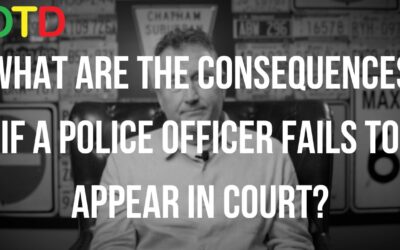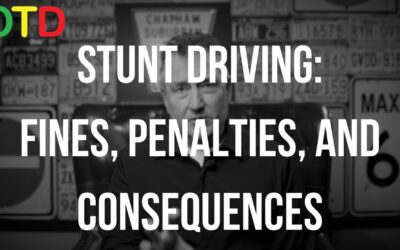Traffic Ticket Myths
When receiving a traffic ticket, there are many myths that can influence your understanding of the situation. It’s important to understand fact from fiction for a clearer legal perspective.
Officer Uniform
Starting with the classic myth – the officer’s uniform, specifically the absence of a hat during ticket issuance. Some believe this informality invalidates the ticket; it does not. Law enforcement attire has no bearing on the validity of a ticket.
Ticket Quotas
Another widespread belief is police quotas, officers at month-end issuing tickets to meet target numbers. In truth, quotas do not drive ticketing practices. Special enforcement periods, like “Seat Belt Month,” are meant to enhance public safety, not to fulfill quotas.
Vehicle Colour
The colour of your vehicle, particularly the red car myth, is also not a factor in attracting police attention. Radar and laser guns used by officers to detect speeding are generally activated from distances where the vehicle’s colour is irrelevant.
Proof / Radar Readings
There’s also the expectation that proof of speeding should be shown on request. Officers are not mandated to display radar readings. This is intended to prevent situations from worsening roadside. The evidence is still admissible in court whether you observed the radar gun’s output or not.
Ticket Errors
Errors on the ticket often give a little hope that your case might be dismissed. Canadian courts possess broad powers to amend such issues. Dismissal of a case based on clerical errors is uncommon unless those inaccuracies mislead the defendant or impair their ability to have a fair defence.
Officer Not Showing Up To Court
Some believe that the ticketing officer’s absence from court guarantees a win. Current systems monitoring officer schedules have largely made this strategy ineffective. Court dates align with officers’ availability, making it highly likely they will attend the proceedings.
Video Transcription:
Traffic Ticket Myths. It’s kind of a fun topic. There are all kinds of questions that are asked about things that are, in our world, certainly interesting. Sometimes they’re actually funny. Not funny if you’re charged with an offense, because that’s a very serious matter indeed. But there are people and persons that will ask questions like, well, I was stopped and the officer served me a ticket and he wasn’t wearing his hat.
Well, unfortunately, that does not mean that that ticket does not count. I think it’s an urban myth. I think there must be something out there that people are tapping into to come to the conclusion that that may be a valid way of getting out of that particular ticket. Another one is that officers have quotas.
They really don’t. Quotas are not really a part of our environment. I can see how that would sort of develop into a potential for misleading the public. For example in October, it’s called Seat Belt Month. And what you will see is targeted enforcement at ramps and on at certain intersections.
And you’ll see officers standing outside of their vehicles. Female and male officers all there. targeting whether or not you’re wearing a seatbelt. From that, I suspect that some clients come to the conclusion that they’re trying to reach their quota because it’s at the end of the month or at the beginning of the month. I can assure you that that’s not an accurate perception at all.
One of the other things that was interesting, this is a younger guy from a few years back. He felt very, very targeted because he was driving a red car. So the myth in his mind was well, if you’re driving a red car, you’re gonna get the ticket. And the reality is nothing like that at all. The officers are very busy and when they’re using their radar gun, it’s too far away. It’s active and they’re reading the radar gun really too far away to identify what the color is. What flags them is the actual reading on a radar gun. Laser is even more like that.
A laser is so far away they can, they can pinpoint the vehicle. Literally on a portion of the front driving license plate and they’re not looking at the color of the vehicle at all. Their interest is in finding the biggest possible speeder. They do gravitate towards that because it’s a larger ticket and it’s more fun for them.
And they’re also looking for the one that’s most likely going to commit the offense to the degree where they’re moving into stunt driving, for example.
Now another sort of myth that comes up is that you know, I was stopped for speeding and the officer did not show me the radar gun. Or, worse, the officer said, no, we’re not, I’m not going to show you the radar gun and some potential clients will come to the conclusion that, well, because that never happened or you made the request and you weren’t allowed to see it, well I should be able to get out of the ticket and, that’s not an accurate perception at all. The evidence is the evidence. You didn’t get to see it. Understandable. I guess I would like to see it too. But they do have that discretion on a busy road to decide whether or not they want to show you that or not. Some officers are of the view that if I show you the radar gun and you see that particular number that you’re going to deny it anyway and the situation may escalate. And that may be a bigger problem at the side of the road. So, it is entirely within the police officer’s discretion. She can decide, for example yes or no, if she wants to do that. And there it does not prejudice the defense. It does not prejudice you in any way.
All of these cases are going to be before a courtroom. All the evidence is going to be sworn, meaning it has to be accurate. Otherwise, you’d be perjuring yourself. So you’d have to believe that the officer would attend and that she would be willing to lie about what that evidence is. And I’m certain in some cases that may happen, but those situations are very perverse and really rare.
So that sort of a myth is, is just simply a myth. It’s not accurate at all. Another is, is errors on the ticket, that I found an error on the ticket misspelled name or, or the like, and on those situations in that particular court, on these type of tickets, there is a very wide a very broad power, very deep power of amendment that exists that corrects all of those errors.
The reason for that is because the judge sitting will only want to hear the merits of the case. They’re not interested in the minor details or the slight inaccuracies. The interest they have in those mistakes or inaccuracies are, well, did it mislead the defense? Did it put you in a position where you could not properly defend yourself?
And the reality is, in most of those cases, no. No, it doesn’t prejudice your ability to defend yourself. And I suppose, to cap off the last one that stands out in my mind, is that the officer will not be showing up in court. I’ve addressed this in other videos. In this system that we work in now, it’s all premised upon digital records.
So, anything the officer is doing from day to day, moment to moment, we have a digital record of that. So, we would know, for example, when the officer is working day shift, afternoons, nights. So, if that officer happens to be on her honeymoon, for example, and not available, well, it probably won’t be scheduled.
And when it is scheduled and you do end up with a court date, well, I can assure you that they’re available and working and if they’re late one of their fellow officers will send her a text and say, Hey, you’re late for court. Get over here. Your case is about to be called. So it’s not something that we would suggest we’re going to rely upon to defend a case. Those days, those days are long past at this point in time. So, there are a number of what I deem to be very interesting myths that still occur, in the day to day practice of OTD Legal. Those are just a few. I hope that helps.




